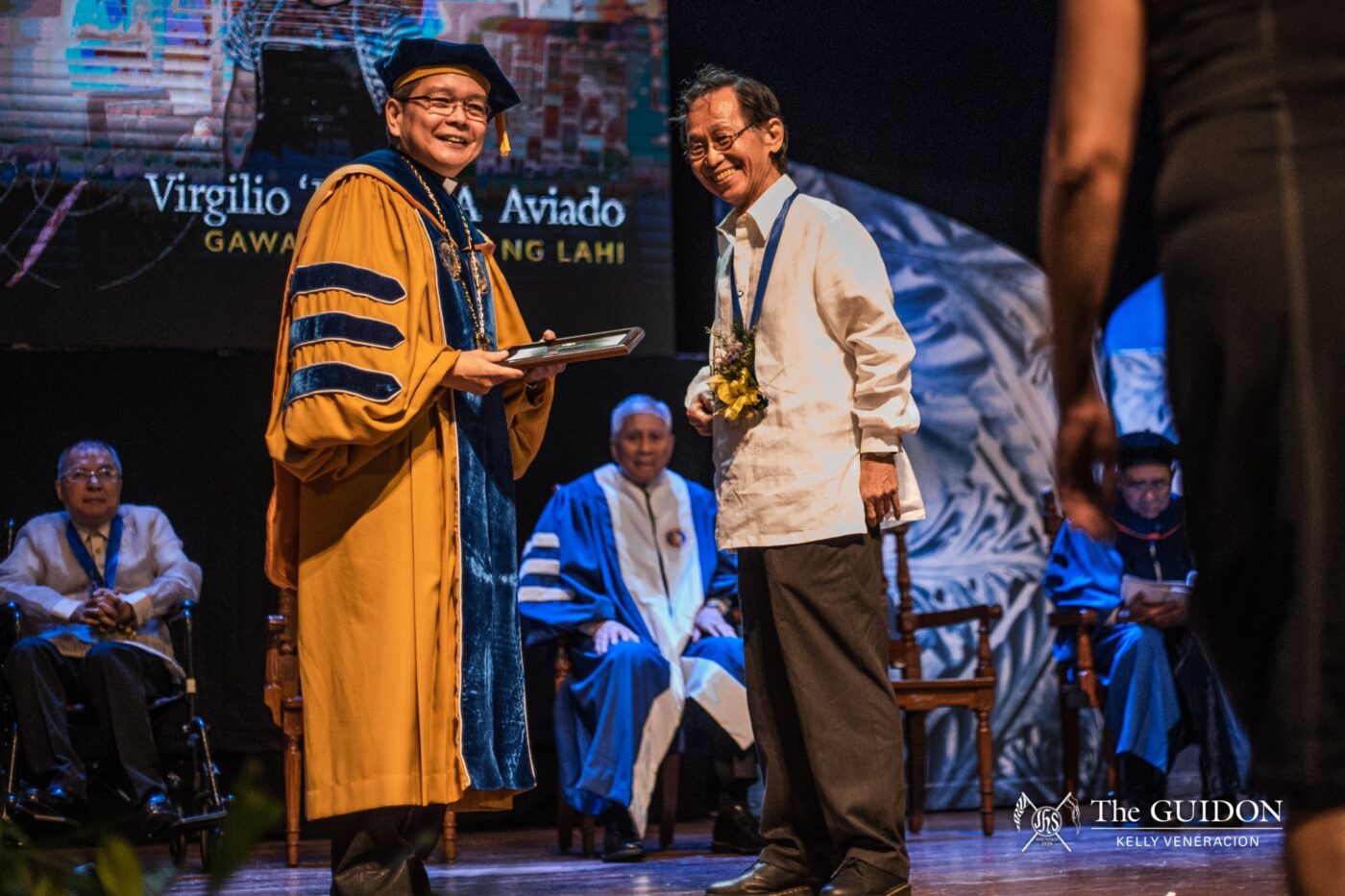FOUR RECIPIENTS of the 2018 Traditional University Awards were lauded for their contributions to the arts, service, law, and diplomacy on Tuesday, September 25 at the Henry Lee Irwin Theater.
Each year, the special academic convocation recognizes outstanding individuals for their exemplification of the University’s values through their respective fields. University President Jose Ramon Villarin, SJ said in a memo that nominees are selected “in the spirit of recognizing those who have been a transformative force in society.”
This year’s recipients were Virgilio “Pandy” A. Aviado for Gawad Tanglaw ng Lahi, Zenaida Brigida “Bridget” Hamada-Pawid for the Ozanam Award, Atty. Carlos “Chochoy” P. Medina Jr. for Parangal Lingkod Sambayanan, and Ambassador Albert F. del Rosario for Doctor of Humanities, honoris causa.
In his opening remarks, Villarin commemorated the sacrifices of those who had fought for the freedom and rights of Filipinos.
“Today, we will do more than just remember,” he said.
Gawad Tanglaw ng Lahi
The Gawad Tanglaw ng Lahi award was conferred on Aviado, one of the pioneers of contemporary printmaking in the country. The award is bestowed on those who have dedicated their work to uphold Filipinism and the Filipino identity.
An alumnus of the Ateneo, Aviado recalled how he first realized his skills in the arts in a summer class he had attended in high school. From there, he continuously nurtured his talents in woodcutting and stone etching.
As a college freshman, he was one of the founding members of the Ateneo Art Gallery (AAG) Arts Club. He introduced several renowned artists to the field of the arts including Santiago Bose, Raymundo Albano, Alfredo Liongoren, Mars Galang and Benedicto Cabrera.
Aviado’s prints have gained recognition both in the national and international setting, promoting both his art and the craft itself. This recognition has also drawn attention to the works of other Filipino printmakers and the Filipino printmaking scene.
“Indeed, behind every print is a story,” Aviado said in his acceptance speech.
Ozanam Award
The Ozanam award was given to Hamada-Pawid for her commitment to upholding the rights of indigenous peoples (IPs). Named after St. Vincent de Paul Society founder St. Frederick Ozanam, this award is given to lay Filipino men and women in recognition of exemplifying Christian values and their vocation for the marginalized sector.
Born in the Cordilleras, Hamada-Pawid is of Ibaloy-Japanese and Bontok descent. Her years in the professional realm were spent writing for the Baguio Midland Courier, along with working as a history instructor in various universities and colleges mainly in the Cordilleras.
She committed herself fully to a ten-year struggle from 1987 to 1997 in the pursuit of social justice through the passage of the Indigenous Peoples’ Rights Act.
“The law is a weapon of justice. It is not in itself an enemy,” she mentioned in her acceptance speech.
In her acceptance speech during the awarding ceremony, Hamada-Pawid encouraged the audience to refrain from referring to IPs as ‘other.’ Additionally, she differentiated indigenous peoples’ plight from that of local armed movements they are often falsely associated with.
“There is a distinct line between being ‘left’ and being Igorot,” she added later.
She forged partnerships with several dioceses and social action centers in the Cordillera Administrative Region, and also served as Chairperson and Commissioner of Region I and the Cordilleras and National Commission on Indigenous Peoples Chairman from 2011 to 2013.
Parangal Lingkod Sambayanan
Presented to persons of outstanding public service, the Parangal Lingkod Sambayanan award for this year was given to Medina Jr. in recognition of a lifetime of pursuit of a human rights advocacy.
Medina Jr. had a number of formative experiences in the Ateneo. While working as a legal aid for clients in the prelature of Malaybalay, he entered the Ateneo School of Law in 1980 and pursued his Master of Laws at the London School of Economics and Political Science of the University of London after the 1984 bar exams.
Later on, he became a part of the Institute of Church and Social Issues, a Jesuit think tank, which assists marginalized sectors in policy reforms. He embarked on a career in defense of electoral integrity and civil society participation.
“I am now a person with disability. I am sick with what is called aneurysm which happened 7 years ago. I cannot walk and eat without assistance. I also cannot see and speak well. But I am fully aware of how important this award is, and I am truly honored,” he said in his acceptance speech, for which he received a standing ovation.
Doctor of Humanities, honoris causa
An honorary degree of Doctor of Humanities was conferred on del Rosario for “instituting reforms that upgraded the diplomacy skills of the career service corps and increased the accessibility of consular services.” Honorary degrees are conferred upon persons of integrity and probity who have dedicated service with compassion in their respective fields.
On defending the Philippine sovereignty and territory, then Department of Foreign Affairs Secretary del Rosario prioritized the dispute on the West Philippine/South China Sea. He constantly upheld the primacy of the Rule of Law and the UN Convention on the Law of the Sea in international assemblies and fora. The Philippines championed an arbitration case against China under his leadership.
“The Philippines has shown the world that we are cable of winning,” he asserted during his response at the convocation.
“We should therefore protest any illegal action by China,” del Rosario added.
Following the presentation of awards, each recipient was given a replica of the Sacred Heart Statuette originally carved by Dr. Jose P. Rizal during his years at the Ateneo Municipal.







